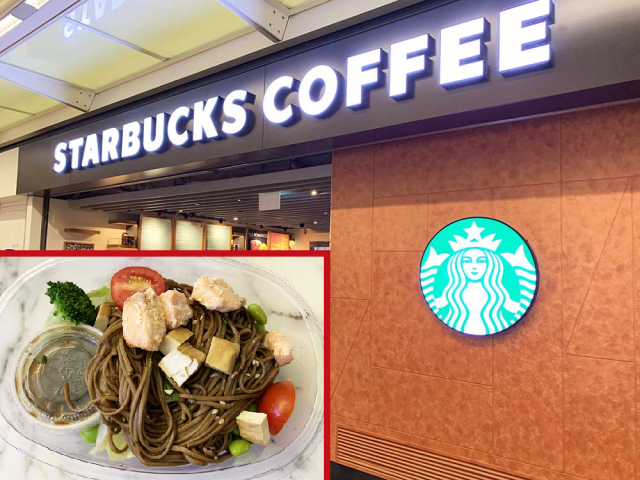
SoraNews24’s resident soba expert finds out what happens when an American coffeehouse whips up some Japanese buckwheat noodles in Hong Kong.
Our Japanese-language reporter Seiji was recently in the U.K., where, among other things, he checked out the awesome manga exhibition being held by the British Museum in London. On his journey back to Japan, Seiji had a layover in Hong Kong, and while he was lucky enough that his flight into Japan didn’t get cancelled or majorly delayed, he still got hungry.
Walking around the airport in search of something to eat, a comforting sight came to Seiji’s slightly homesick eyes when he saw the word “soba” on a sign outside one of the airport’s eateries.
Seiji knows a thing or two about Japanese buckwheat noodles, having reviewed over 170 soba restaurants for our Japanese-language sister site, so he walked into the restaurant expecting the aroma of soba broth to be waiting for him. Instead, he detected the pleasant but unexpected scent of coffee, and that’s because the restaurant offering the soba noodles was none other than…
…Starbucks!
While the Japanese division of Starbucks is always enthusiastic about offering Japanese-style treats, even in Japan there’s no Starbucks soba. So Seiji walked up to the counter and placed his order for the noodles, which cost HK$61 (US$7.75).
He was a little disappointed that instead of the fancy plate shown on the sign, his soba noodles instead came in a plastic pack. But on second thought, that would make it easier for busy travelers to take their noodles on the go, so the practical presentation is understandable.
Popping the top revealed a mixture of vegetables (broccoli, lettuce, and tomato) as well as cubes of cheese and slices of salmon. This is all pretty unorthodox, as in Japan you won’t find any of those mixed in with soba (and the same goes for the sesame seeds). Still, considering that Starbucks’ official name for the menu item is “Soba Noodle Salad,” some original accouterments are to be expected, and appearance-wise, the dish’s looks has the sort of fashionable look you’d expect from a Starbucks salad. The noodles themselves are particularly dark, making Seiji think that a large portion of the soba husk was used in making them, like with the Otoinebbu soba in Hokkaido, Japan’s northern island.
What Seiji was feeling uneasy about, though, was the broth. For chilled soba in Japan, the broth, called dashi, is a mixture of soy and bonito stock. Instead, the Starbucks soba’s broth appears to be a mix of soy sauce and sesame oil, a combination that’s greasier than traditional dashi and also has a different smell.
Now that he’d gotten an eyeful, it was time for a mouthful, so Seiji poured the broth onto the noodles and took a bite.
So how was it? Not bad, but also, in Seiji’s opinion, not soba.
While the noodles themselves qualify, the rest of the package is pretty incongruent with Japanese soba traditions, as a result of it having different toppings and seasonings from what soba chefs use in Japan. Because of that, if you’re a seasoned soba enthusiast looking to get your fix, this probably isn’t going to scratch that itch.
But on the other hand, Seiji says, if you’re craving some noodles with a more Chinese-style flavor (thanks to the sesame oil), Starbucks’ soba will do the trick, plus give you a unique fusion cuisine experience of an American company’s Hong Kong division trying its hand at remixing a Japanese dish.
Cafe information
Starbucks (Hong Kong International Airport Terminal 1 branch)
Located near Gate 44
Open 7 a.m.-12:30 a.m.
Photos ©SoraNews24
● Want to hear about SoraNews24’s latest articles as soon as they’re published? Follow us on Facebook and Twitter!
[ Read in Japanese ]
Follow Casey on Twitter, where soba is, by far, the Japanese noodle type he misses the most when he’s overseas.